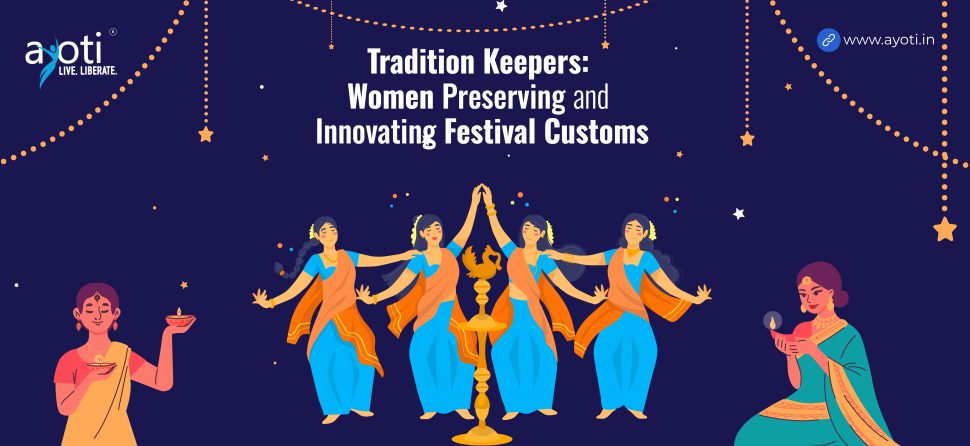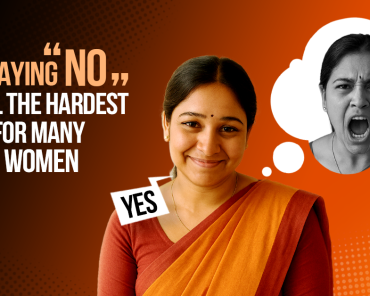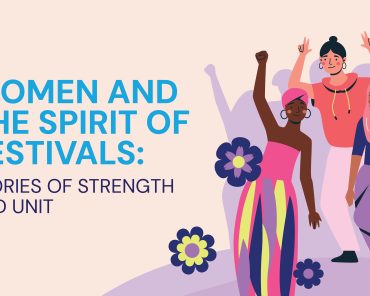By ayoti
Tradition Keepers: Women Preserving and Innovating Festival Customs
Festivals serve as vibrant expressions of cultural heritage, uniting communities in celebration and reflection. Behind these colourful spectacles lie the efforts of dedicated individuals, particularly women, who serve as the guardians of tradition. Here, let’s see how women act as tradition keepers, preserving age-old customs and infusing them with innovation for the future.
Festivals as Cultural Heritage
Festivals hold profound significance in preserving cultural heritage. They encapsulate centuries-old traditions, beliefs, and practices, serving as a living testament to a community’s identity and values. Whether rooted in religious observance, seasonal changes, or historical events, festivals provide a window into the rich tapestry of human culture.
The Role of Women as Tradition Keepers
Women play a central role in the preservation and transmission of festival customs. Often serving as the primary caretakers of family and community traditions, women ensure the continuity of rituals and ceremonies from one generation to the next. Their contributions extend beyond mere participation; they are the custodians of cultural memory and the driving force behind the sustainability of festivals.
Preserving Tradition: Examples from Around the World
- Japan: Obon Festival
In Japan, the Obon festival holds deep cultural and spiritual significance. Dedicated to honouring ancestral spirits, Obon features traditional dances known as Bon Odori. Women, often the bearers of these ancient dances, meticulously pass down choreography and ritual practices to preserve the essence of the festival. Through their graceful movements and reverence for tradition, women play a vital role in ensuring the continuity of Obon customs.
- India: Diwali
Diwali, the Festival of Lights, illuminates the Indian subcontinent with its vibrant celebrations. Women are at the heart of Diwali preparations, from meticulously cleaning and decorating homes to preparing elaborate feasts and sweets. Through their dedication to maintaining cultural practices and creating a festive atmosphere, women uphold the spirit of Diwali as a time of renewal, prosperity, and community.
- Brazil: Carnival
Carnival in Brazil is a dazzling spectacle of music, dance, and vibrant costumes. Behind the scenes of this extravagant celebration are countless women who contribute to its success. From designing intricate costumes to choreographing elaborate samba routines, women infuse Carnival with creativity and passion. Their efforts not only preserve the traditions of Carnival but also push boundaries, incorporating new elements and ensuring its relevance for future generations.
Rural Communities: Small-Scale Traditions
In rural communities worldwide, women are the keepers of small-scale traditions that often go unnoticed. From crafting handmade decorations to preparing traditional dishes, women play a vital role in preserving the cultural fabric of their communities. Their commitment to passing down ancestral knowledge ensures that these traditions endure, serving as a source of pride and connection for future generations.
Modernising Festivals: Women’s Leadership
Women increasingly take on leadership roles in festival planning and organisation, driving innovation and inclusivity. From incorporating eco-friendly practices to promoting diversity in programming, women reimagine festivals to reflect modern values and sensibilities. Their leadership ensures festivals remain dynamic and accessible, attracting new audiences while honouring tradition.
Indigenous Festivals: Acts of Resistance and Revitalization
For indigenous women worldwide, festivals are celebrations and acts of resistance and revitalization. By reclaiming ancestral lands, languages, and customs, indigenous women preserve their cultural heritage in the face of colonialism and cultural erasure. Through powwows, Pasifika festivals, and other artistic gatherings, indigenous women keep ancient traditions alive while forging new pathways for cultural revitalization.
Celebrating Tradition Keepers
In every corner of the globe, women serve as the backbone of festival traditions, preserving cultural heritage and shaping the future of celebration. From Japan to Brazil, from rural villages to urban centres, women’s contributions to festivals are invaluable, ensuring that customs endure and evolve with the times. As we celebrate festivals worldwide, let us recognize and honour the women who serve as tradition keepers, guardians of our cultural heritage, and architects of our shared future.





